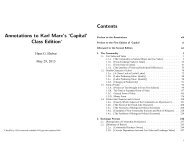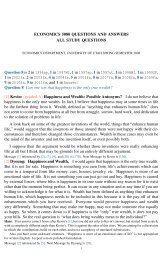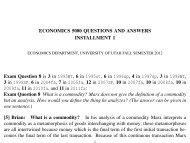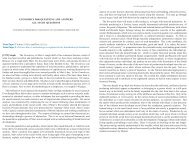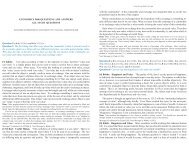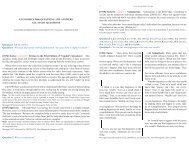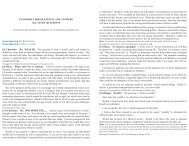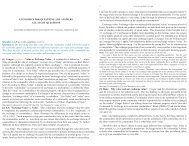Question 1 What did Marx mean with his formu - University of Utah
Question 1 What did Marx mean with his formu - University of Utah
Question 1 What did Marx mean with his formu - University of Utah
Create successful ePaper yourself
Turn your PDF publications into a flip-book with our unique Google optimized e-Paper software.
U <strong>of</strong> <strong>Utah</strong> Econ 5080 2007fa 83<br />
the core <strong>of</strong> the society provides a commodity <strong>with</strong> its value and the superficial process that<br />
takes place in the market place (<strong>with</strong> its particular environment and social relations) give it<br />
its exchange-value. T<strong>his</strong> distinction is important to <strong>Marx</strong> as it highlights the (exploitative)<br />
workings <strong>of</strong> a capitalist society. Had <strong>Marx</strong> used the word “value” instead <strong>of</strong> “exchange<br />
value”, the distinction between the surface and the heart would have collapsed. T<strong>his</strong>, in my<br />
opinion, would have defeated <strong>his</strong> objectives <strong>of</strong> highlighting the exploitation (<strong>of</strong> the working<br />
class) that takes place in a capitalist society.<br />
Message [96] referenced by [158]. Next Message by Daru is [131].<br />
<strong>Question</strong> 223 is 144 in 1999SP, 160 in 2001fa, 173 in 2002fa, 176 in 2003fa, 203 in<br />
2004fa, 200 in 2005fa, 220 in 2007SP, 228 in 2008fa, 241 in 2009fa, 268 in 2010fa, 234<br />
in 2011fa, and 244 in 2012fa:<br />
<strong>Question</strong> 223 Describe the joint work <strong>of</strong> all commodities which is necessary to appropriately<br />
express the value <strong>of</strong> one commodity.<br />
[85] Charles: Joint work <strong>of</strong> all commodities and their combined value. The value<br />
<strong>of</strong> one commodity does depend on the joint work <strong>of</strong> all commodities. The final value <strong>of</strong><br />
the product is the combination <strong>of</strong> all the labor, parts, engineering, etc... associated <strong>with</strong><br />
making the product. All <strong>of</strong> the products in one commodity are passive until they have to be<br />
exchanged or bought. The final value <strong>of</strong> the commodity is given by the person purchasing<br />
it for the first time or making an exchange for another commodity. That’s when everything<br />
comes together as a joint work in order to express the value. We also have to consider that<br />
almost all the commodities will have an item which will determine the main value <strong>of</strong> the<br />
product. Linen would be for the coat, lumber would be for the house, engine for the car,<br />
etc... Even though there are many other items associated <strong>with</strong> making a coat, building a<br />
house or a car, they are more likely to be passive until the time comes for everything to be<br />
considered in order to express the value <strong>of</strong> the commodity.<br />
Hans: Charles, you have creative ideas, and it is interesting to read how you see things. But most <strong>of</strong> your answers<br />
have very little to do <strong>with</strong> <strong>Marx</strong>’s theory. For instance, your answer here discusses how the use-value <strong>of</strong> each<br />
commodity draws on the use-values <strong>of</strong> its components, while <strong>Marx</strong> is discussing how the value <strong>of</strong> a commodity is<br />
expressed in the surface interactions. You should have learned by now not to confuse value and use-value, see my<br />
[30].<br />
Message [85] referenced by [105]. Next Message by Charles is [179].<br />
[89] Desk: The Value <strong>of</strong> a Commodity. When I look at the definition <strong>of</strong> commodity<br />
according to <strong>Marx</strong> I see that a commodity is something for which there is demand, but which<br />
is supplied <strong>with</strong>out qualitative differentiation across a given market. Every commodity has a<br />
certain value attached to it which requires work at a given point. That is where the joint work<br />
<strong>of</strong> all commodities comes into play when you express the value <strong>of</strong> one commodity. Thomas<br />
Cooper explained something great <strong>with</strong> one simple phrase “Take away from a piece <strong>of</strong> bread<br />
the labor bestowed by the baker on the flour, by the miller on the grain brought to him, by the<br />
farmer in plowing, sowing, tending, gathering, threshing, cleaning and transporting the seed,<br />
and what will remain? A few grains <strong>of</strong> grass, growing wild in the woods, and unfit for any<br />
human purpose.” T<strong>his</strong> statement describes perfectly what is <strong>mean</strong>t by the joint work <strong>of</strong> all<br />
commodities which is necessary to express the value <strong>of</strong> one commodity. <strong>Marx</strong> explains that<br />
all commodities express values in the General equivalent, t<strong>his</strong> general equivalent commodity<br />
is directly exchangeable <strong>with</strong> all commodities. If you take an ordinary commodity to market,<br />
84 2007fa Econ 5080 U <strong>of</strong> <strong>Utah</strong><br />
two questions must be resolved for a change to go through: (1) does your trading partner<br />
need your commodity and (2) how much <strong>of</strong> <strong>his</strong> own commodity is he going to give you for<br />
your commodity. (159:2) In the case <strong>of</strong> t<strong>his</strong> piece <strong>of</strong> bread, everyone is reliant on every one’s<br />
commodity, the trade must take place. There will be shared values given to reap the reward<br />
in the end. T<strong>his</strong> also is why you will pay more for the one commodity (bread) while you do<br />
not see the joint work that takes place to make it possible.<br />
Hans: You are saying several loosely related things in your answer, but the right answer to question 223 is not<br />
among them. Look at [2005fa:815] for instance.<br />
Message [89] referenced by [92]. Next Message by Desk is [252].<br />
[98] Gregory: “The joint work <strong>of</strong> all commodities...” We all know that every commodity<br />
consists <strong>of</strong> a “value” that is determined individually by its process <strong>of</strong> labor and value <strong>of</strong><br />
use to the consumer. Consequently, determination <strong>of</strong> a single trade variable (i.e. currency in<br />
the form <strong>of</strong> paper money or gold) is neccessary for the universal trade <strong>of</strong> commodities. Understanding<br />
that all commodities have a determined use value that allows the commodity to<br />
be qualitatively and quantitatively compared to others, the need for a “universal commodity”<br />
to represent all commodities on a larger scale is greatly evident. Although we as consumers<br />
know that paper money has little to no actual use value, in relation to the joint work <strong>of</strong><br />
all commodities, it performs the ultimate function necessary for the trade and exchange <strong>of</strong><br />
commodities in the market. <strong>Marx</strong> explains that in <strong>his</strong> General form <strong>of</strong> value “10lbs.<strong>of</strong> tea =<br />
20yds. <strong>of</strong> linen, 40lbs.<strong>of</strong> c<strong>of</strong>fee = 20yds. <strong>of</strong> linen, therefore 10lbs <strong>of</strong> tea = 40lbs <strong>of</strong> c<strong>of</strong>fee.<br />
In other words 1lb. <strong>of</strong> c<strong>of</strong>fee contains only a quarter as much <strong>of</strong> the substance <strong>of</strong> value, that<br />
is, labor, as 1lb <strong>of</strong> tea.” In concern to the joint work <strong>of</strong> all commodities, t<strong>his</strong> indicates that<br />
they are all in direct correlation due to their values determined by labor and use, which are<br />
ultimately represented by the value <strong>of</strong> one universal commodity. If the exchange <strong>of</strong> commodities<br />
in the market and their values were determined solely by the individual based on<br />
their personal use value for that particular commodity, the result would be a market <strong>with</strong><br />
little uniformity or structure. In t<strong>his</strong> case, commodities would have little or no joint work.<br />
In conclusion, my understanding is that <strong>Marx</strong>’s General form <strong>of</strong> value is the joint work <strong>of</strong><br />
all commodities that are ultimately measured to one single commodity.<br />
Message [98] referenced by [105] and [182]. Next Message by Gregory is [144].<br />
[105] Hans: Value and Use-Value must be distinguished. Charles’s answer [85] describes<br />
how the use-value <strong>of</strong> a complex product (coat, house, car) depends on the use-values<br />
<strong>of</strong> its components. T<strong>his</strong> is not only true for commodities but for all complex products, and<br />
it is not what <strong>Marx</strong> <strong>mean</strong>s. When <strong>Marx</strong> says “value” he <strong>mean</strong>s the congealed abstract labor<br />
inside the commodities, which makes them exchangeable.<br />
Gregory [98] is better because it does stay on the value-side <strong>of</strong> commodities, instead <strong>of</strong><br />
discussing their use-values. Gregory sees correctly that the “joint work <strong>of</strong> all commodities”<br />
is the willingness to accept one and the same commodity as the general equivalent. But there<br />
are still some differences between what <strong>Marx</strong> says and what Gregory says:<br />
(a) Gregory says that that which makes commodities exchangeable, its “value,” is “determined<br />
individually by its process <strong>of</strong> labor and value <strong>of</strong> use to the consumer.” There are<br />
two mistakes in t<strong>his</strong>. (i) In <strong>Marx</strong>’s theory, the value is determined only by labor content,<br />
not by the use-value. Use-value and demand determine how much <strong>of</strong> the commodity will be<br />
produced, but not the price. Here <strong>Marx</strong> differs from mainstream economics. (ii) Although



